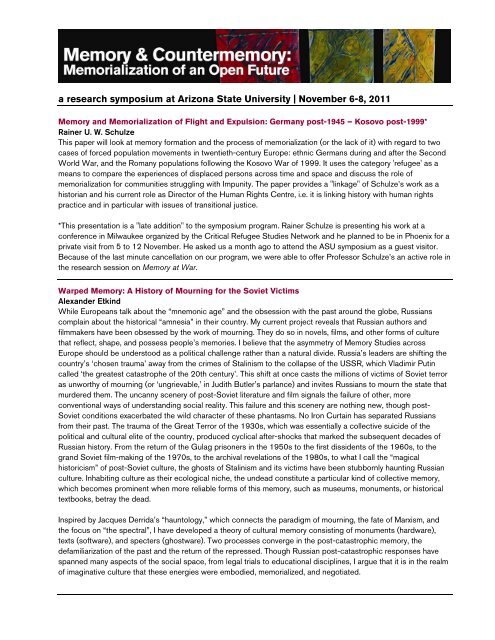Symposium Program (printable PDF) - ASU Jewish Studies
Symposium Program (printable PDF) - ASU Jewish Studies
Symposium Program (printable PDF) - ASU Jewish Studies
You also want an ePaper? Increase the reach of your titles
YUMPU automatically turns print PDFs into web optimized ePapers that Google loves.
a research symposium at Arizona State University | November 6-8, 2011Memory and Memorialization of Flight and Expulsion: Germany post-1945 – Kosovo post-1999*Rainer U. W. SchulzeThis paper will look at memory formation and the process of memorialization (or the lack of it) with regard to twocases of forced population movements in twentieth-century Europe: ethnic Germans during and after the SecondWorld War, and the Romany populations following the Kosovo War of 1999. It uses the category 'refugee' as ameans to compare the experiences of displaced persons across time and space and discuss the role ofmemorialization for communities struggling with Impunity. The paper provides a "linkage" of Schulze’s work as ahistorian and his current role as Director of the Human Rights Centre, i.e. it is linking history with human rightspractice and in particular with issues of transitional justice.*This presentation is a "late addition" to the symposium program. Rainer Schulze is presenting his work at aconference in Milwaukee organized by the Critical Refugee <strong>Studies</strong> Network and he planned to be in Phoenix for aprivate visit from 5 to 12 November. He asked us a month ago to attend the <strong>ASU</strong> symposium as a guest visitor.Because of the last minute cancellation on our program, we were able to offer Professor Schulze’s an active role inthe research session on Memory at War.Warped Memory: A History of Mourning for the Soviet VictimsAlexander EtkindWhile Europeans talk about the “mnemonic age” and the obsession with the past around the globe, Russianscomplain about the historical “amnesia” in their country. My current project reveals that Russian authors andfilmmakers have been obsessed by the work of mourning. They do so in novels, films, and other forms of culturethat reflect, shape, and possess people’s memories. I believe that the asymmetry of Memory <strong>Studies</strong> acrossEurope should be understood as a political challenge rather than a natural divide. Russia’s leaders are shifting thecountry’s ‘chosen trauma’ away from the crimes of Stalinism to the collapse of the USSR, which Vladimir Putincalled ‘the greatest catastrophe of the 20th century’. This shift at once casts the millions of victims of Soviet terroras unworthy of mourning (or ‘ungrievable,’ in Judith Butler’s parlance) and invites Russians to mourn the state thatmurdered them. The uncanny scenery of post-Soviet literature and film signals the failure of other, moreconventional ways of understanding social reality. This failure and this scenery are nothing new, though post-Soviet conditions exacerbated the wild character of these phantasms. No Iron Curtain has separated Russiansfrom their past. The trauma of the Great Terror of the 1930s, which was essentially a collective suicide of thepolitical and cultural elite of the country, produced cyclical after-shocks that marked the subsequent decades ofRussian history. From the return of the Gulag prisoners in the 1950s to the first dissidents of the 1960s, to thegrand Soviet film-making of the 1970s, to the archival revelations of the 1980s, to what I call the “magicalhistoricism” of post-Soviet culture, the ghosts of Stalinism and its victims have been stubbornly haunting Russianculture. Inhabiting culture as their ecological niche, the undead constitute a particular kind of collective memory,which becomes prominent when more reliable forms of this memory, such as museums, monuments, or historicaltextbooks, betray the dead.Inspired by Jacques Derrida’s “hauntology,” which connects the paradigm of mourning, the fate of Marxism, andthe focus on “the spectral”, I have developed a theory of cultural memory consisting of monuments (hardware),texts (software), and specters (ghostware). Two processes converge in the post-catastrophic memory, thedefamiliarization of the past and the return of the repressed. Though Russian post-catastrophic responses havespanned many aspects of the social space, from legal trials to educational disciplines, I argue that it is in the realmof imaginative culture that these energies were embodied, memorialized, and negotiated.


